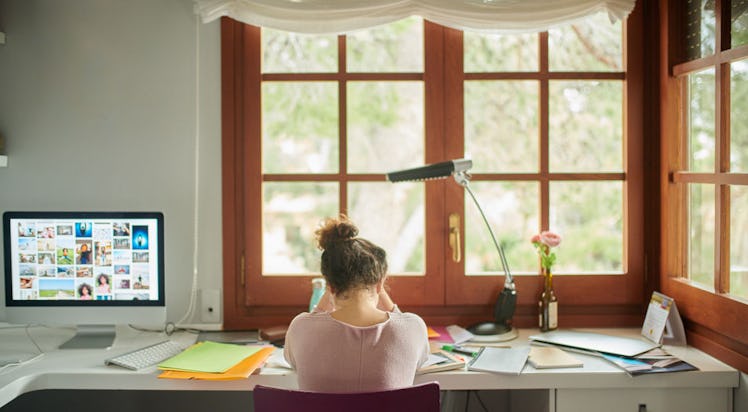
A Migraine Expert Reveals The Best Ways To Handle Your Pain When It Hits You At Work
If you get migraines or chronic headaches, then you know how suddenly the pain can come on and sabotage your mood, your energy levels — the whole nine. Personally, my migraines leave me in a pretty vulnerable state, especially when I get them around other people. In those situations, it's not always easy to figure out how to deal with a migraine at work, or at school, or any environment where you don't exactly have control over things that might make the pain worse, like blinding fluorescent lights, or loud, screeching noises. Still, it's not impossible — in my experience, it all comes down to having a strategy or plan in place that you can turn to whenever the pain begins to set in.
According to Mark Canadic, a licensed homeopath, holistic health coach, and founder of Migraine Professional, getting a migraine at work can be painful on multiple levels. Not only is the headache itself difficult to deal with, he says, a typical work environment usually has many triggers for migraines — you know, like lights that are too bright, unexpected noises, stress, long hours, heck, even that guy who sits across from you who can't use his indoor voice when he's on the phone. These things can all trigger migraines, Canadic tells Elite Daily over email. So, what do you do if your head is pounding and you haven't even hit lunchtime yet?
If you suspect that a migraine is about to come on, Canadic says your first order of business should be to take any relevant medications prescribed to you by your doctor for the pain, or an over-the-counter painkiller that you've found to be helpful.
Next, says Canadic, try to cut out any sources of blue light, such as computer or phone screens and fluorescent lighting. According to Canadic, these types of lights can aggravate photosensitivity (aka an extreme sensitivity to various sources of light, including UV rays from the sun, as per Healthline) that may either cause or exacerbate headaches. The homeopath also recommends avoiding any odors that are especially pungent (i.e. maybe don't do your work in the office kitchen until the pain subsides), as well as harsh or loud sounds, as these can both potentially make the pain worse.
Additionally, says Canadic, it's important for people who have migraines to stay on top of how much water they drink each day, as he tells Elite Daily that dehydration can definitely trigger the pain or make it worse.
Once you've managed your hydration levels, medication, and exposure to various environmental triggers, Canadic suggests you take a moment to intentionally lower your stress levels with some deep, belly-based breathing. Specifically, he recommends taking about 10 deep breaths, where each exhale lasts about four to six seconds. Drawing out those exhales, he explains, can be extremely relaxing for the body, and if stress is one of the things triggering your migraine, a simple strategy like this could be more effective than you think.
Here's the thing: As Canadic points out, there are countless other remedies and tricks to soothe migraine and headache pain — but they won't necessarily work for every single person and every single situation. According to Canadic, when it comes to migraines, you have to be patient and test out different remedies, and be willing to go through a little bit of trial-and-error, to find what works for you.
Having said that, Canadic tells me that some of the treatments he and his clients have found success with include ginger tea, having some turmeric powder with black pepper, or placing magnesium and essential oils on the source of the pain. Additionally, drinking caffeine with your medication can sometimes be helpful (according to the American Migraine Foundation, it's not known why exactly caffeine can help the pain for some people, but the general idea is that it blocks certain receptors in the brain that can trigger a migraine or make it worse), but again, it really depends on the person and their unique circumstances.
The best thing you can do for your migraines, no matter who you are, says Canadic, is work on figuring out your triggers. Whether it's diet soda, bright lights, salty foods, dehydration — keep tabs of what seems to cause your pain, as well as what relieves it.
"See if you can track down what triggered [the migraine], because the sooner you start tracking," Canadic says, "the easier it will be to find the source, stop it, and avoid it for next time."